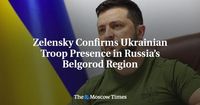Ukrainian President Volodymyr Zelensky confirmed on April 8, 2025, that Ukrainian forces are operating in Russia's Belgorod region for the first time since the onset of the war. This announcement marks a significant escalation in the ongoing conflict, as it represents the first acknowledgment of Ukrainian troops being active in Russian territory.
Belgorod, which borders Ukraine, has been a frequent target of Ukrainian airstrikes and lies adjacent to Russia's Kursk region. This area has seen intense fighting since Kyiv launched a surprise incursion last year, with Ukrainian forces struggling to maintain a foothold amidst ongoing Russian offensives.
In his daily address, Zelensky stated that General Oleksandr Syrsky, Ukraine's commander in chief, had reported on “our presence in the Kursk region and our presence in the Belgorod region.” He emphasized the importance of these operations, asserting, “We continue to conduct active operations in the border areas on the enemy’s territory, and this is absolutely right – the war must return to where it came from.”
This is the first time in over three years of conflict that Zelensky has explicitly mentioned Ukrainian military activities in Belgorod, a region with a population of approximately 1.5 million. The Russian military acknowledged in March that it was facing land attacks in Belgorod, coinciding with Ukrainian forces' attempts to relieve pressure on the front lines in Kursk.
According to the DeepState military blog, which is closely aligned with Ukraine's military, Ukrainian troops currently control a 13 square kilometer (five square mile) area near the Russian border village of Demidovka. This strategic foothold allows Ukraine to conduct operations aimed at drawing Russian troops away from their assaults on Ukrainian regions such as Sumy and Kharkiv.
Officials in Kyiv have indicated that these cross-border incursions are a tactical move to force Russia to shift its military focus, thereby alleviating pressure on Ukrainian defenses in other critical areas. Zelensky reiterated the importance of these actions, stating, “The commander in chief reported on the activity of our units along the border, as well as in the so-called grey zone and directly on enemy territory.”
The implications of Zelensky's announcement are profound, as it signals a shift in the dynamics of the conflict. By confirming the presence of Ukrainian forces within Russian territory, Ukraine is potentially setting the stage for further military actions that could escalate the conflict even more.
As the situation develops, it remains to be seen how Russia will respond to these incursions. The Kremlin has historically reacted strongly to any perceived threats to its territorial integrity, and the acknowledgment of Ukrainian forces operating in Belgorod may provoke a significant military response.
Both sides are currently engaged in a war of attrition, with each seeking to exploit weaknesses in the other's defenses. The ongoing conflict has resulted in significant casualties and destruction on both sides, with no end in sight.
In the broader context, Zelensky's announcement reflects Ukraine's determination to reclaim lost territory and assert its military capabilities against a much larger adversary. The Ukrainian government has been vocal about its commitment to defending its sovereignty and pushing back against Russian aggression.
As the war continues to unfold, the international community watches closely, with many nations expressing support for Ukraine's right to defend itself. The situation remains precarious, with the potential for further escalations that could have wider implications for regional stability and security.
In conclusion, Zelensky's confirmation of Ukrainian forces operating in Belgorod marks a significant development in the ongoing conflict with Russia. As both sides prepare for potential escalations, the focus remains on the humanitarian impact of the war and the need for a resolution that respects Ukraine's sovereignty and territorial integrity.




